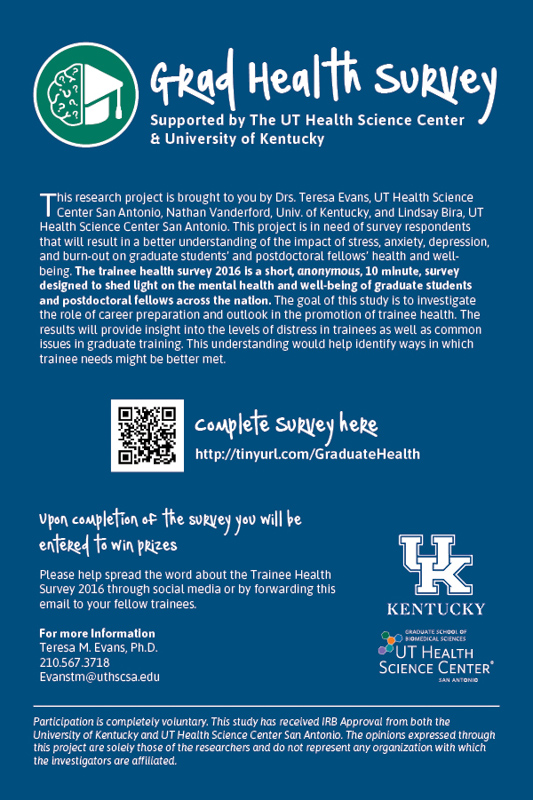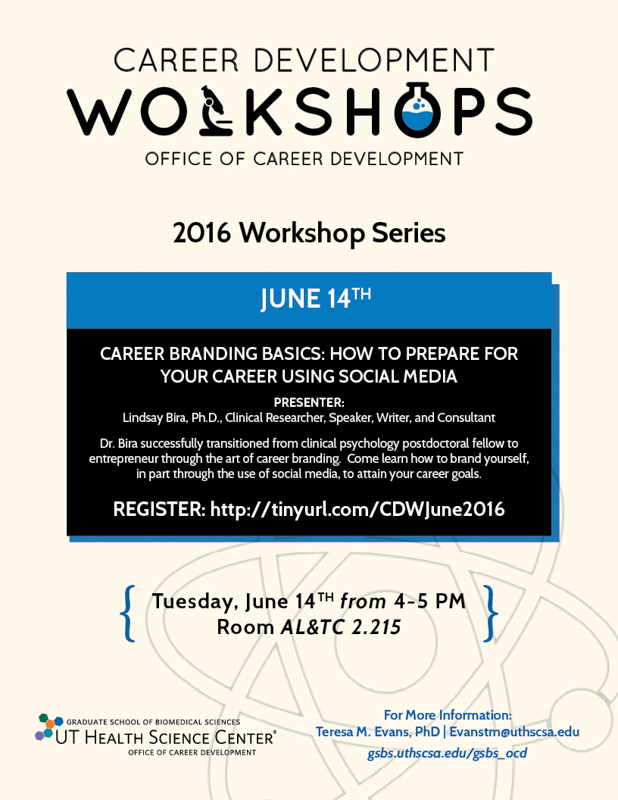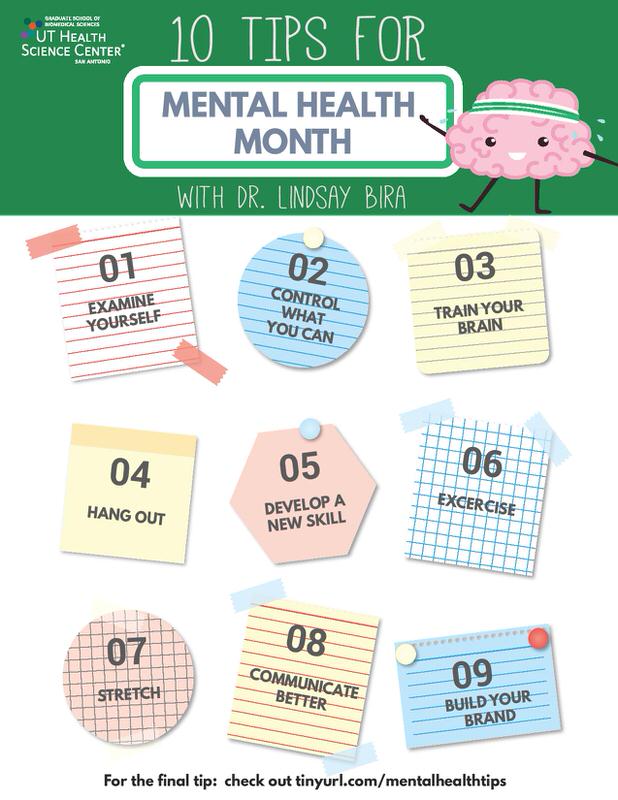The Career Series: How To Decrease Stress In Your Life
 As a clinical health psychologist, I help people work with
As a clinical health psychologist, I help people work with
their mind, body and environment in order to lessen the effects of stress.
Stress has a multitude of negative effects
and chronic stress carries the highest risk of harm.
What options do you have when a period of
high demand and potential chronic stress (like graduate training or other life
events) cannot be avoided? You have no
choice but to face it head-on and figure out how to cope.
This brings to light very important questions, including
what stress during graduate training looks like and how it’s affecting our
trainees. Researchers, including myself, are recently taking a closer look into
this area.
Dr.
Nathan Vanderford, assistant professor at the University of Kentucky, Dr. Teresa Evans, director of the Office of
Career Development at UT Health Science
Center,and this post’s author, Dr.
Lindsay Bira, a postdoctoral resident at UT Health Science Center and consultant in the community, have
launched an international, anonymous, seven minute survey to measure symptoms of
anxiety, depression, stress and burnout in graduate trainees. The survey and its researchers were featured
by Science
Magazine.
 You can take the survey
You can take the survey
to contribute to the cause and be entered into a drawing for an iPad, Kindle, or
gift card. We need more respondents so
that we can better understand distress and common issues related to graduate
training. With that understanding, we
can identify ways in which trainee needs might be better met.
Of course, research takes a long time and it’s likely that
you’ll be quickly returning to the stress of your workload. To help with that, I’ve prepared “10 Mental
Health Tips for Getting Through a Stressful Period.” Take a look, and reflect:
1) Examine
yourself. Self-awareness is key in
managing stress: know what begins to
happen for you when stress increases. Do
you tend to get anxious? Depressed? Procrastinate? Not eat as much? It’s easy to fall into states and coping
styles that contribute to stress further.
If you know what that is for you, you can flag it when it begins to
happen and then make a shift.
2) Control
what you can, and let go of what you can’t.
If you can identify which pieces of a situation you have control over,
you can actively move to solve the problem.
We get stuck when we ruminate over things we cannot control and
personalize events. For things we can’t
control, we need to focus on how we react to them and make moves to gain
control over ourselves. See #3!
3) Train
your brain. Exercise those frontal
lobes to improve emotional regulation and cognition. When we are stressed, we are using more emotional
areas of the brain,which can negatively
paint perspective and misguide behavior.
Mindfulness practice has been shown to shut down the fight-or-flight
response as well as improve mood and attention.
Learn more at www.mindful.org or come check out my mindfulness group at The
Pearl.
4) Hang out. Schedule time with your friends, or find new
ones. Being social is a great buffer for
stress, even when you feel you don’t have time for it. Be better balanced by scheduling social time
and sticking with it. This has been
shown to release endorphins and adjust perspective so that you can approach the
next task in a healthier way. Check out UTHSCSA’s events or contact Dr. Teresa Evans (evanstm@uthscsa.edu) to find
out about events that merge both worlds.
5) Develop a
new skill. This should be something
that is unrelated to your work. Is there
an instrument you’ve always wanted to play?
A hobby you’ve wanted to pick up?
Check out www.meetup.com for people
doing exactly what you want to do in your area – the best part: many things are free! Growing in an area that is unrelated to work
creates balance and motivation for less enjoyable tasks.
6) Exercise. We know this is good for the mind as well as
the body. There have been studies that
show exercise to be equally effective as antidepressants for improving mood. Get moving and keep that as an important part
of your schedule. If you can’t do it on
your own, find a meetup.com group for accountability!
7) Stretch.
When we take up more space, we feel more powerful and mood
improves. Dr. Amy Cuddy has the 2nd most watched
TED Talk based on her research in this
area. Spreading out gives our brain
feedback that our environment is safe and we are in control. Stretch and hold it first thing in the
morning, before a stressful meeting or talk, and when you feel beaten down by
your workload to adjust how you feel.

8) Communicate
better. When we get our needs met,
we feel good, but getting there is an art.
It’s important to strike the balance of assertive communication. Being too passive (considering others’ needs
and not our own) or aggressive (considering our needs and not others’) sets us
up to fail. Practice communicating
clearly and in a way that considers the other person while highlighting what is
important for you and why.
9) Build
your brand. Identify your passion,
find your vision and plan a path for you to follow. Doing this can provide motivation for moving
forward and comfort in knowing where to go next. Check out my previous
blog post on this. I’ll be giving a talk on Professional Branding on June 14th. Dr. Teresa Evans, Director of the
Office of Career Development, also helps trainees in this area.
10) Change yourself. For the better. We can all adjust in ways that make us
healthier versions of ourselves.
Sometimes, this takes talking to
a professional. See if your
insurance plan has an Employee Assistance Program (EAP), which might offer a
set of sessions for free.
If you are experiencing significant mental health symptoms,
let a provider know —UTHSCSA’s Student
Health Center is a great way to start.
Make an appointment by calling (210) 567-9355 and obtain referrals from
there. You can also find a mental health
professional by contacting your insurance or using Psychology Today’s Therapist Finder tool. This
site lists profiles of therapists in your area so you view their approach and
see what best fits your needs.
Dr. Lindsay Bira is an active member of our Career Advisory Council where she mentors UT Health Science Center trainees. Don’t miss her talk on June 14 about how to prepare for your career using social media. RSVP here.
For the infographic:

